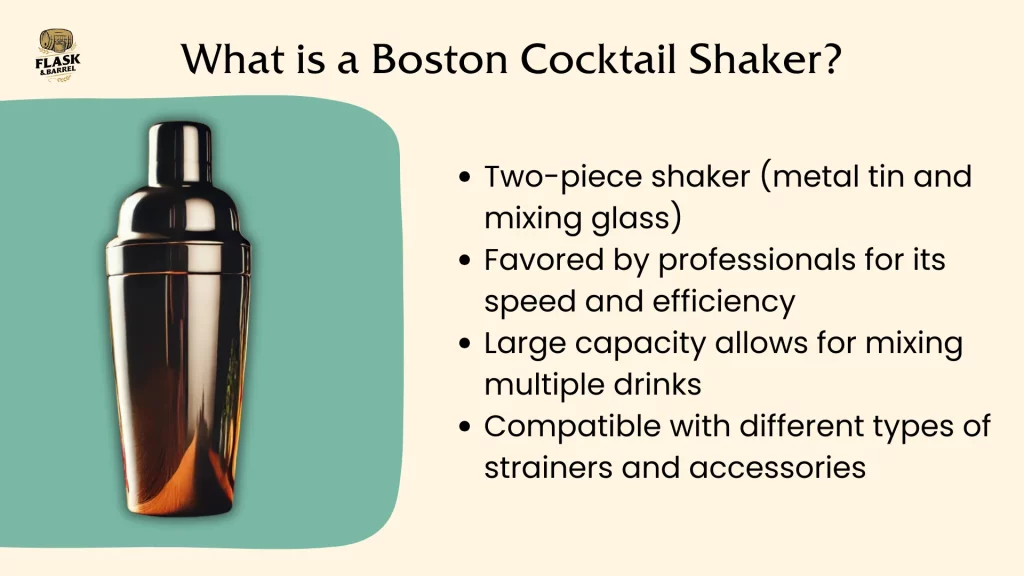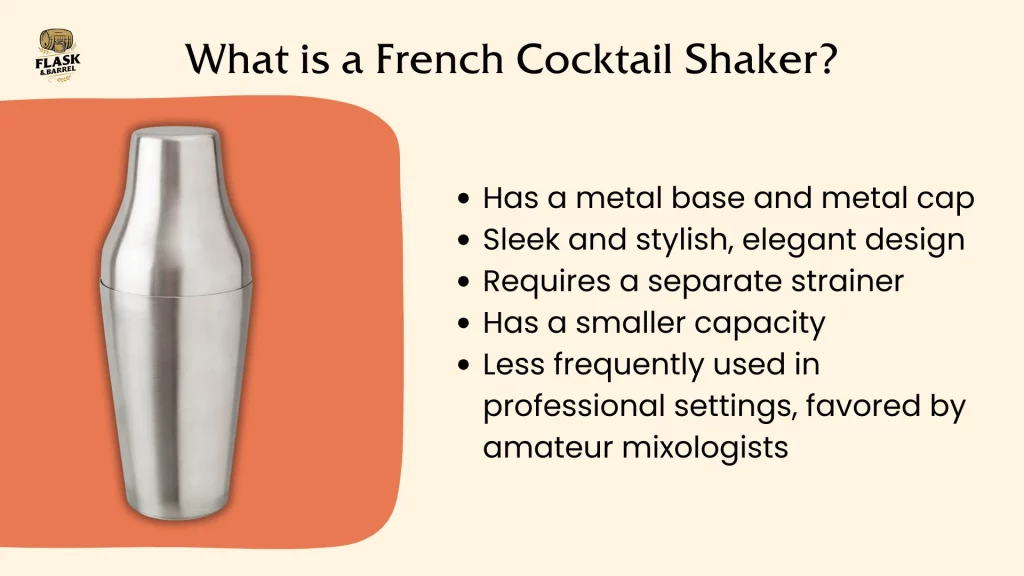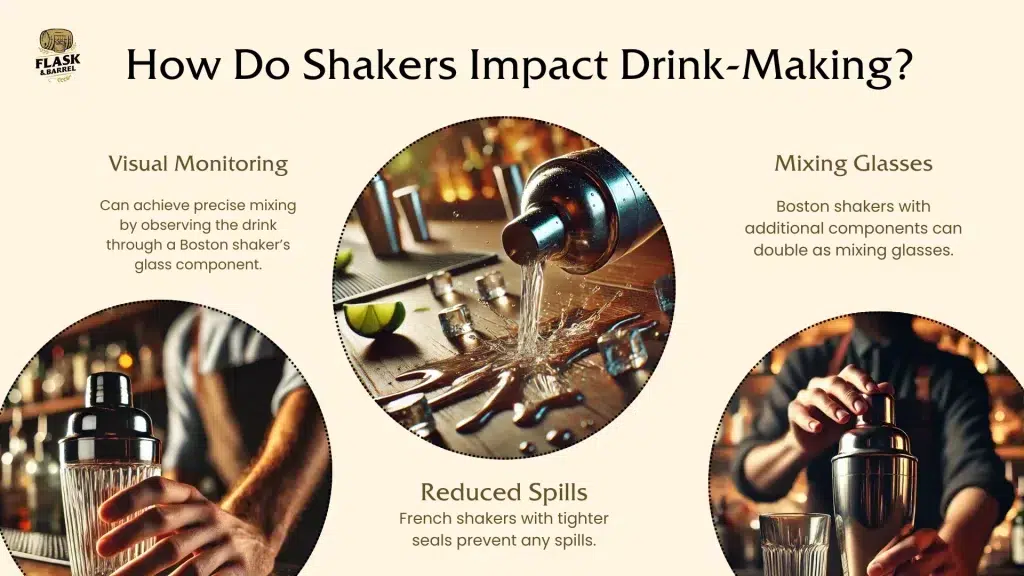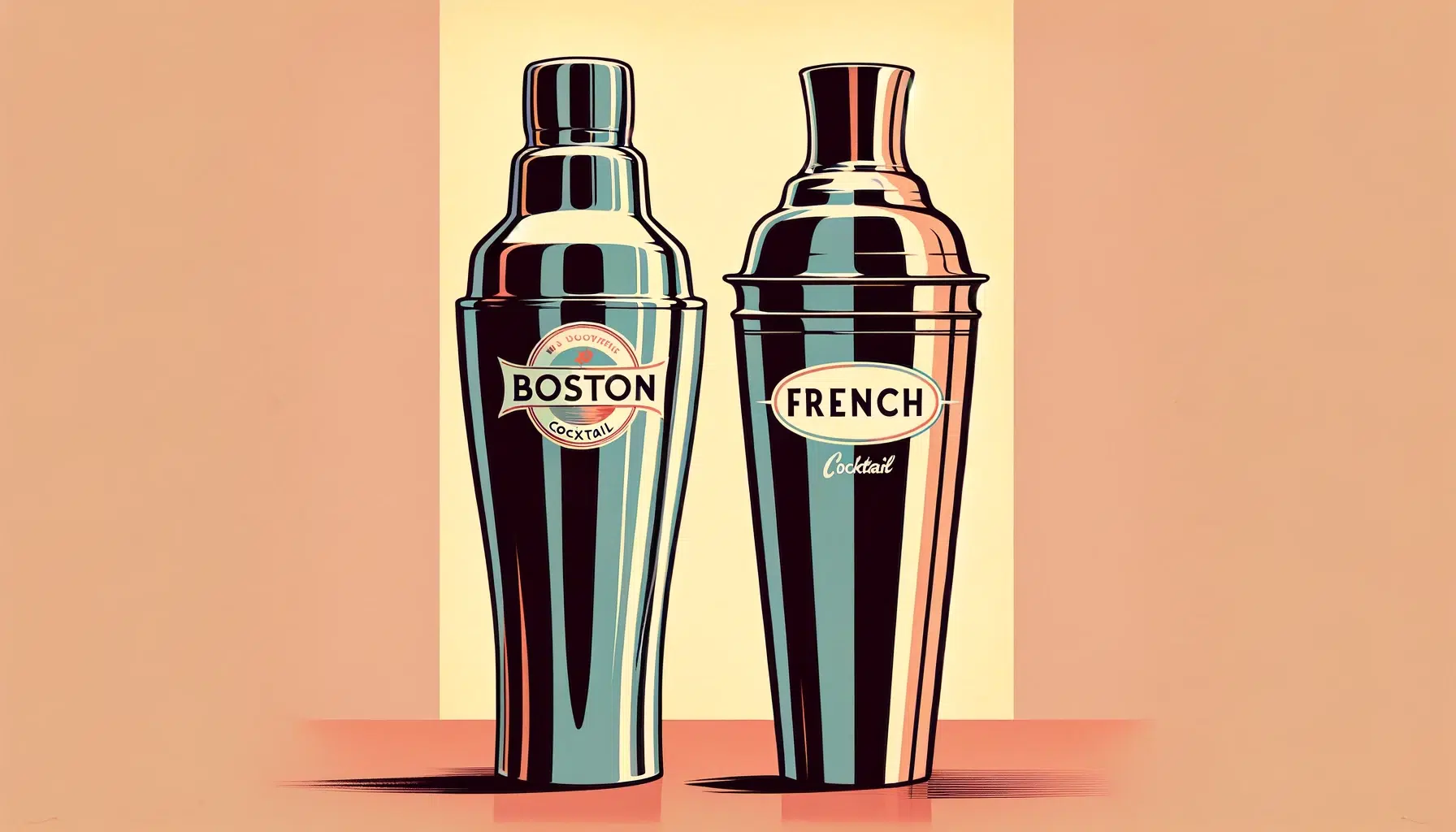Boston and French cocktail shakers are often compared but each has its unique charm and functionality. The Boston shaker, with its straightforward design, is favored for its versatility and ease of use. This simplicity sets it apart in the cocktail world, offering a practical experience that distinguishes it from other shakers.
Key components of the Boston shaker include a metal tin and a mixing glass, often paired with a Hawthorne strainer for optimal performance. In contrast, the French shaker, also known as the Parisian shaker, stands out with its elegant design, featuring a metal tin and a metal cap. This all-metal construction offers a more secure seal, reducing spills and enhancing durability.
Delving deeper, each type of shaker brings its own set of advantages, from ease of use and durability to aesthetic appeal. The following sections will explore these aspects in detail, providing a comprehensive understanding of what makes each shaker a valuable tool in the art of cocktail making.
What is a Boston cocktail shaker?
A Boston cocktail shaker is a two-piece shaker consisting of a metal tin and a mixing glass. This design is straightforward and efficient, making it a popular choice among bartenders. The metal tin and glass fit snugly together, creating a seal that allows for effective shaking.
Often, a Hawthorne strainer is used with the Boston shaker to strain the drink after shaking. Its practical design and ease of use make it ideal for both professional bartenders and home mixologists.

Two-piece shaker
The Boston cocktail shaker is a two-piece shaker that combines simplicity and functionality, making it a staple in many bars.
Consists of a metal tin and a mixing glass
It consists of a metal tin and a mixing glass, which fit together seamlessly to form a secure seal for effective shaking.
Often used with a Hawthorne strainer
A Hawthorne strainer is often used with the Boston shaker to efficiently strain the drink after shaking, ensuring a smooth pour.
What is a French cocktail shaker?
A French cocktail shaker, also known as a Parisian shaker, is a two-piece shaker that offers both elegance and functionality. It consists of a metal tin and a metal cap, providing a more secure seal compared to other shakers. This all-metal construction not only enhances durability but also adds to its aesthetic appeal.
The French shaker is favored by bartenders who appreciate its sleek design and reliable performance in cocktail making.

Two-piece shaker
The French cocktail shaker is a two-piece shaker that seamlessly blends sophistication with practicality.
Consists of a metal tin and a metal cap
It consists of a metal tin and a metal cap, ensuring a secure seal and enhancing overall durability.
Also known as a Parisian shaker
Also known as a Parisian shaker, it is favored for its elegant design and reliable performance in the art of cocktail making.
How do the sealing mechanisms differ?
The sealing mechanisms of Boston and French cocktail shakers differ significantly. The Boston shaker relies on a tight fit between the metal tin and the mixing glass, which may require a firm tap to seal properly. In contrast, the French shaker uses a metal cap to seal the tin, providing a more secure and straightforward closure.
These differences impact the ease of use and the likelihood of spills during shaking, with the French shaker generally offering a more reliable seal.
Boston shaker relies on a tight fit between the tin and glass
The Boston shaker relies on a tight fit between the metal tin and the mixing glass to create an effective seal.
French shaker uses a metal cap to seal the tin
The French shaker uses a metal cap to seal the tin, offering a more secure and straightforward closure.
Boston shaker may require a firm tap to seal
The Boston shaker may require a firm tap to ensure that the tin and glass fit together securely, reducing the risk of leaks.
Which shaker is easier for beginners?
The Boston shaker is generally considered easier for beginners due to its simpler design and straightforward sealing mechanism. Its combination of a metal tin and mixing glass allows for easier handling and a more intuitive shaking process. On the other hand, the French shaker may require more practice to seal properly with its metal cap, making it slightly more challenging for novices.
Overall, the Boston shaker’s user-friendly design makes it a preferred choice for those new to cocktail making.
Boston shaker is generally easier due to its simpler design
The Boston shaker is generally easier for beginners thanks to its simpler design and straightforward sealing mechanism, which facilitates easier handling.
French shaker may require more practice to seal properly
The French shaker may require more practice to seal properly with its metal cap, making it slightly more challenging for novices to master.
How do materials affect durability?
The materials used in Boston and French cocktail shakers significantly impact their durability. The Boston shaker features a glass component that can break if mishandled, though its metal tin is quite durable. In contrast, the French shaker is made entirely of metal, which enhances its overall durability and reduces the risk of breakage.
This all-metal construction makes the French shaker a more robust option for long-term use. Understanding these material differences helps bartenders choose the right shaker for their needs.
Boston shaker’s glass can break if mishandled
The Boston shaker’s glass component can be fragile and may break if mishandled, affecting its overall durability.
French shaker is more durable due to all-metal construction
The French shaker is more durable due to its all-metal construction, which significantly reduces the risk of breakage and enhances longevity.
Boston shaker’s metal tin is also durable
Despite the fragility of its glass component, the Boston shaker’s metal tin is quite durable, offering a robust option for cocktail shaking.
What are the cleaning requirements?
Cleaning requirements for Boston and French cocktail shakers vary due to their different materials. The Boston shaker requires careful cleaning of its glass part to avoid breakage, while its metal tin is more straightforward to clean. The French shaker, with its all-metal construction, is generally easier to clean and more resilient to damage.
Both shakers are dishwasher safe, but hand washing is recommended to maintain their longevity and performance. Understanding these cleaning requirements helps bartenders keep their tools in optimal condition.
Boston shaker requires careful cleaning of the glass part
The Boston shaker requires careful cleaning of its glass part to avoid breakage and ensure its longevity.
French shaker is easier to clean due to its all-metal parts
The French shaker is easier to clean due to its all-metal parts, making it more resilient and simpler to maintain.
Both shakers are dishwasher safe but hand washing is recommended
Both shakers are dishwasher safe, but hand washing is recommended to maintain their performance and extend their lifespan.
How do shakers impact drink-making?
The type of cocktail shaker used can significantly impact the drink-making process. The Boston shaker allows for visual monitoring of the drink through its glass component, which can be beneficial for precise mixing. Additionally, the metal tin can double as a mixing glass.
On the other hand, the French shaker provides a more secure seal with its metal cap, reducing the risk of spills and ensuring a smoother shaking experience. Each shaker offers unique advantages that can influence the efficiency and quality of cocktail preparation.

Boston shaker allows for visual monitoring of the drink
The Boston shaker allows for visual monitoring of the drink through its glass component, which is beneficial for achieving precise mixing.
French shaker provides a more secure seal, reducing spills
The French shaker provides a more secure seal with its metal cap, effectively reducing the risk of spills during the shaking process.
Boston shaker can double as a mixing glass
The Boston shaker’s metal tin can also double as a mixing glass, enhancing its versatility in cocktail preparation.
Which shaker do professionals prefer?
Professional bartenders often have preferences based on the specific needs of their craft. The Boston shaker is frequently preferred for its versatility and ease of use, making it a staple in many bars. Its straightforward design allows for quick and efficient drink preparation.
In contrast, the French shaker is favored for its aesthetic appeal and secure seal, which can enhance the presentation and reduce spills. Some bartenders use both types, selecting the one that best suits the drink they are making. Understanding these preferences helps in choosing the right tool for professional cocktail making.
Boston shaker is often preferred for its versatility and ease of use
The Boston shaker is often preferred by professionals for its versatility and ease of use, making it an essential tool in many bars.
French shaker is favored for its aesthetic appeal
The French shaker is favored for its aesthetic appeal and secure seal, which enhance both the presentation and the practicality by reducing spills.
Some bartenders use both depending on the drink
Some bartenders opt to use both types of shakers, selecting the one that best suits the specific drink they are preparing.
What are the cost differences?
The cost differences between Boston and French cocktail shakers can be notable. Boston shakers are generally more affordable due to their simpler design and common use of materials like glass and metal. In contrast, French shakers can be more expensive, often reflecting their all-metal construction and elegant design.
Prices for both types can vary based on brand and material quality, but the Boston shaker tends to be the more budget-friendly option. Understanding these cost differences helps buyers make informed decisions based on their needs and budget.
Boston shakers are generally more affordable
Boston shakers are generally more affordable due to their simpler design and common use of materials like glass and metal, making them budget-friendly.
French shakers can be more expensive due to design
French shakers can be more expensive, often reflecting their all-metal construction and elegant design, which contribute to their higher price point.
Price varies based on brand and material quality
The price for both types of shakers can vary significantly based on brand and material quality, allowing for a range of options to suit different budgets.
How do shakers affect drink temperature?
The type of cocktail shaker used can influence the drink’s temperature. The Boston shaker’s glass component can warm up quickly, potentially affecting the drink’s chill. In contrast, the French shaker’s metal construction retains cold better, helping to maintain the desired temperature.
Both shakers can be pre-chilled to enhance their cooling efficiency, ensuring that cocktails are served at the optimal temperature. Understanding these temperature effects allows bartenders to choose the right shaker for achieving the perfect drink.
Boston shaker’s glass can warm up quickly
The Boston shaker’s glass component can warm up quickly, potentially affecting the drink’s chill during preparation.
French shaker’s metal retains cold better
The French shaker’s metal construction retains cold better, helping to maintain the desired temperature for the cocktail.
Both shakers can be pre-chilled for better results
Both shakers can be pre-chilled to enhance their cooling efficiency, ensuring that cocktails are served at the optimal temperature.





